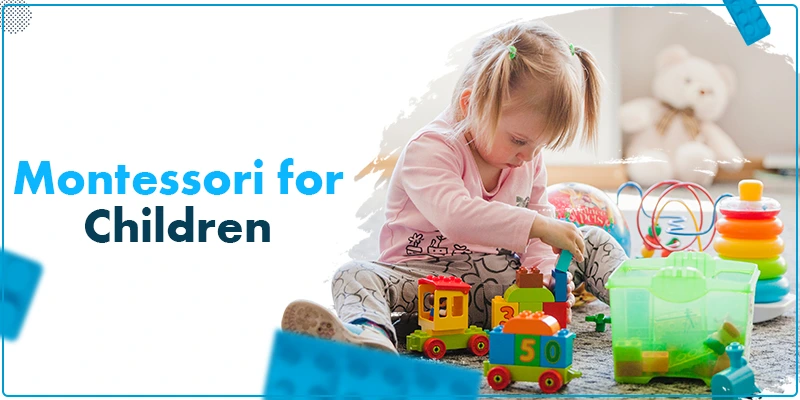
Educating young children is a shared responsibility. Teaching them in a way that they enjoy can lead to great success. One effective approach is the Montessori method, which emphasizes learning through play. This method allows each child the opportunity and time to grasp the basics of language and math by engaging in interesting games. Let’s explore why the Montessori method is particularly successful for educating children with special needs.
Our Responsibility In Educating Children With Special Needs
Children with special needs possess unique abilities and challenges, requiring tailored approaches to their education. Our responsibility lies in creating inclusive learning environments that cater to their diverse needs. This involves providing specialized instruction, assistive technology, and therapies to help them reach their full potential. By fostering understanding and empathy, we can empower these children to overcome obstacles and participate fully in society. It's essential to advocate for their rights, ensuring they receive equal opportunities and support. Ultimately, our goal is to create a world where all children should feel safe and enjoy learning, without any differences based on their abilities.
How Does Montessori Method Of Teaching Helps Children With Special Needs?
The Montessori method can be particularly beneficial for children with special needs due to its emphasis on individualized learning, sensory experiences, and practical life skills. Here's how it helps:
-
Individualized Learning: Montessori classrooms allow children to work at their own pace, which can be especially helpful for children with learning differences or developmental delays. Teachers can tailor activities to each child's needs and abilities, ensuring they feel challenged and successful.
-
Practical Life Skills: Montessori emphasizes activities of daily living, such as dressing, cleaning, and cooking. These skills are essential for independence and can be adapted to suit the abilities of children with special needs.
Montessori Early Intervention For Special Needs
Montessori early intervention for special needs offers a promising approach to support the process of educating young children with developmental delays or disabilities. By providing a well-structured, sensory-rich environment, the Montessori educators can help these children develop their essential skills like fine motor skills, language, and social interaction. Montessori education has unique methods to teach children with special needs. Early intervention is necessary to increase a child's potential, and the Montessori method, with its focus on practical life skills and hands-on learning, can significantly contribute to their overall development and future success.
Montessori Special Needs Integration
Montessori education is great for integrating children with special needs into mainstream classroom teaching techniques. This inclusive model offers several advantages that support special learners. One of the key benefits is individualized learning, where an individual child gets all the attention while learning. This happens to all kids. Teachers develop tailored learning plans that meet the unique needs of each child, including those with special needs, ensuring that every student can progress at their own pace. Additionally, Montessori classrooms are designed to be sensory-rich environments, which can be particularly beneficial for children with sensory processing disorders or developmental delays. The stimulating atmosphere promotes engagement and exploration. Boston College offers degree and diploma programs in the Montessori method of education. This helps college freshers to start their career as Montessori teachers.
Montessori Therapy For Special Needs
Another plus point of Montessori education is its focus on acquiring practical life skills. The method proposes activities that are centred on self-care and daily living which helps children with special needs to cultivate independence and build confidence that are essential for their development. The social integration that prevails in Montessori classrooms is very important, as it encourages interaction among children of different abilities. This interaction is a delight to watch and encourages empathy, understanding, and acceptance, creating a supportive community. Finally, the Montessori approach emphasizes positive reinforcement and self-correction, which nurtures a warm and encouraging learning environment for all children. Montessori education facilitates the academic growth of children with special needs and at the same time concentrates on improving their social skills, emotional resilience, and overall development, making it a valuable model for inclusive education.
Adapted Montessori Materials For Special Needs
Montessori materials can be adapted and curated in order to meet the unique needs of children with special needs. For instance, children with sensory processing disorders may benefit from materials with specific textures or sounds, while those with motor impairments might need larger or easier-to-manipulate objects. Visual aids, like pictures, flash cards or symbols, can greatly support children with language delays or autism spectrum disorder. Diploma in Montessori enables you to become an optometrist and find a career path in this branch of science. By modifying existing learning materials or creating new ones, Montessori educators have to make sure that all children, regardless of their abilities, have access to a rich and engaging learning environment.
Montessori education in India is a perfect blend of Dr Maria Montessori's child-centered philosophy and the rich cultural heritage of India. The Montessori method stands out as an effective and compassionate approach to education for children with special needs. Its style of individualized learning, sensory experiences, practical life skills, and positive reinforcement creates a positive environment where every child can thrive easily. By fostering inclusivity and promoting social interaction,
How Montessori Helps Special Needs Children?
Montessori education helps children with special needs build confidence, develop essential skills, and cultivate meaningful relationships. In order to provide equitable education, embracing the principles of Montessori is needed as it empowers all children to overcome challenges and realize their full potential. This method ultimately leads to a more inclusive society that focuses on independence, freedom within limits, and a deep respect for the child's natural curiosity.
In conclusion, educators who implement the Montessori For Special Needs method can effectively extend their teaching techniques to children with special needs and positively impact their lives.